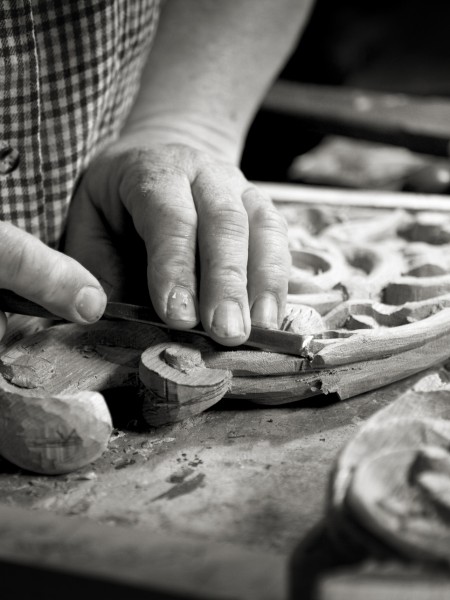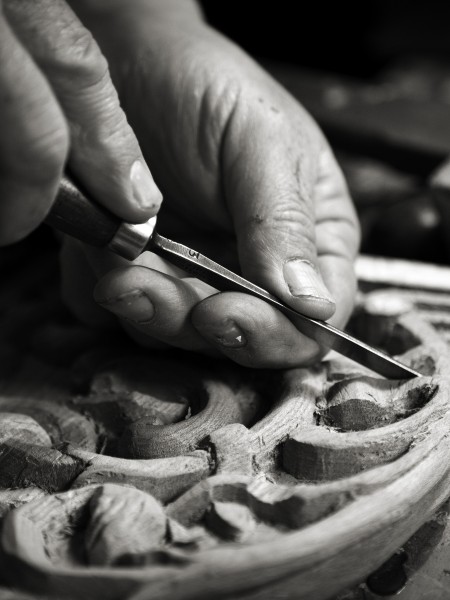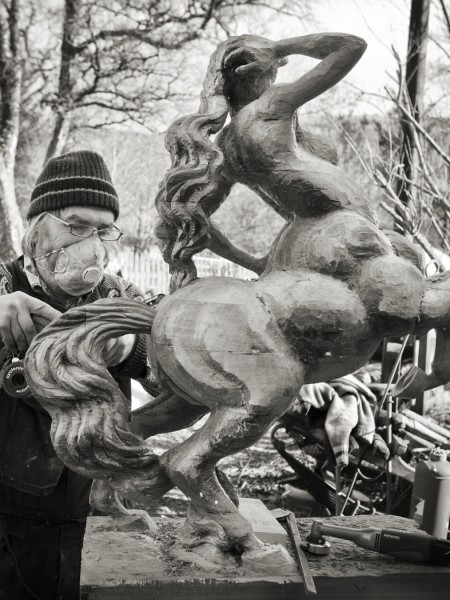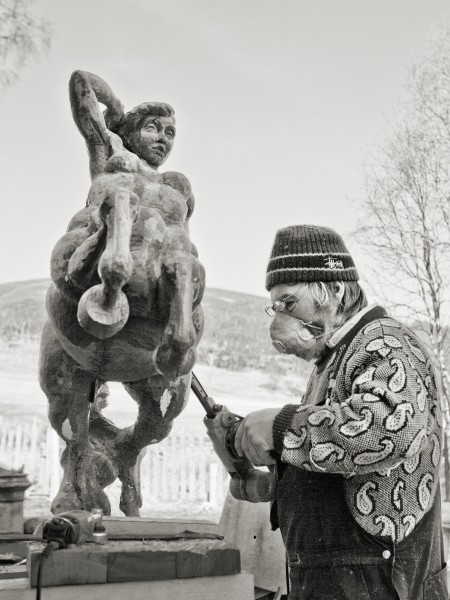Q. What inspired you to learn the skills you’ve got today?
A. Well initially it was through drawing that I started. I’ve always been interested in things theatrical and very much to do with popular arts. A lot of the subject matter I used in my drawings going way back 30/40 years have related … to things like fairgrounds, circus, theatre, musical.
I don’t know where this stemmed from because I wasn’t exposed to that much in the way of theatre, theatrical experience or cinema … being from Peterhead, but I always wanted to use my drawings, first out as a vehicle to show my interest in and enthusiasm for that type of thing, then it seemed like quite a natural development to go into the three dimensional side of it…and I felt that drawings translated quite easily into the three dimensional. … I also loved the type of carving you come across in churches and grave yards and that sort of thing as well.
Q. How did you learn your skill?
A. Well basic skills also came from the fact I’m an engineer. After leaving school, much to my disappointment, I wasn’t deemed as being art school material at school because I didn’t have the academic requirements. Luckily, as it turned out, I was then told I could go ahead and do an engineering apprenticeship… I quickly grew aware that this was going to be a useful thing to have in my life.
Determined that I was … to go to art school anyway… I used this as a sort of stepping stone acquiring the academic qualifications. I did then go ahead and to art school and I’ve found the combination of the skills that I learned in the four years I served my time as an engineer helped greatly.
Q. Could you tell us a little about your time as an engineering apprentice?
A. It was a very interesting time. I mean, I was in despair for a start due to being quite immature I suppose and not really realising the benefits that this was going to offer me … but I got a job in the Cross and Blackwells food factory, in Peterhead. It was a canning factory, which was one of the main industries in Peterhead at the time, as it turned out it was a terrific social experience because a lot of the people that were there were just so interesting and colorful and pretty marvelous when I look back on it thinking in terms of life in general …
Q. Was Peterhead thriving then?
A. Absolutely, very much at the peak of the post war boom. The fishing industry was doing extremely well. My dad was working in one of the factories that had been built there, like an engineering factory … although Peterhead was a smaller place then and there was no oil influence whatsoever there did seem to be a real buzz about the place. There was a lot of local pride about the place as well you know it had a real sort of reputation Peterhead for being a hard working, hard drinking area. So there were a lot of pretty tough people there but pretty good, hardworking ethic.
Q. How much do you feel the skills you’ve acquired over the years, with the training in engineering and art ,give you the freedom to express yourself?
A. They’ve definately reinforced the freedom, the skills that I’ve got, as regards to the procedural way about how you work out a plan.
Q. Do you think skills are essential to put your ideas into practice?
A. For me yes, skills habits knowledge of materials that sort of thing, I think that’s just something that comes with time, I suppose it’s getting back to the definition of what a skill really is is just a knowing about the materials and tools and being able to express in a most efficient a way as possible anything that your want to do I suppose. I’m up against difficulties and barriers and that which you’ve got to somehow get through it’s never easy.. in fact so difficult at times that I feel I never want to do some of these things again.
Q. What is the role of duration and repetition when learning a skill?
A. … You don’t know what people’s abilities or inabilities are, this is the problem… With all the best will in the world you want to be able to help them and the only thing you can say is, look. here, just try working away at this, and you give them a bit of wood. I just … say to them look, this is going to take a while. It’s not going to be an immediate result … you’ve really got to work at it.
It it might be the case that somebody is just naturally adapted with working with that type of thing.
The only way that it can be found out is to try …
Q. Do you enjoy teaching people?
A. Yes, I do. it can be an incredibly rewarding thing. … I enjoyed the college experience I had teaching there, it was great, but it was quite structured.
Further education was a bridge between school and what they eventually wanted to do so they knew that if they did what I asked them that they would be rewarded at the end of the day by being able to go to art school and as such they were only too keen, so that was quite a good working experience I had.
But working on a one to one basis again that depends on the relationship you have with the individual.
Q. Would you say that wood carving is now your major skill, it it something that you are a master craftsman in?
A. No, I’ve still got a lot to learn, a massive amount to learn and thats why its good for me to keep an open mind with regards who I work for, and what I do because it’s where you get the variety.
Tel. 01975651798
Easter Corriehoul
Corgarff, Strathdon
AB36 8YL



